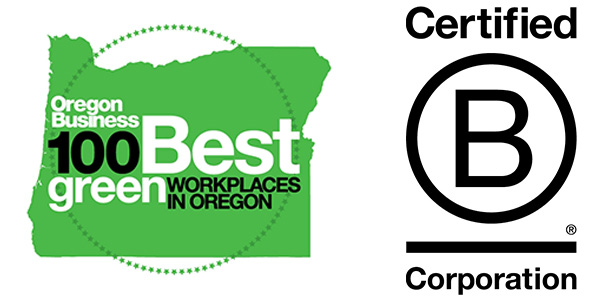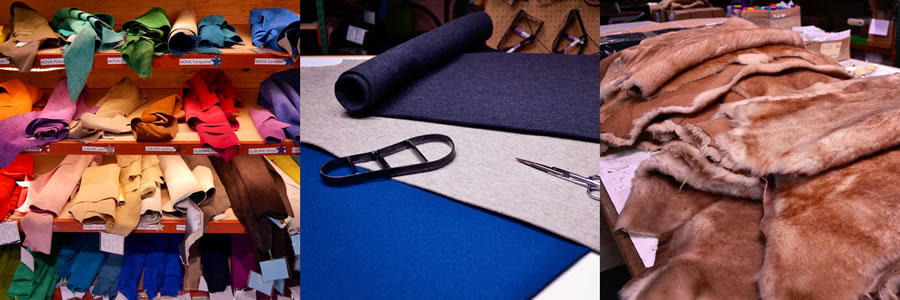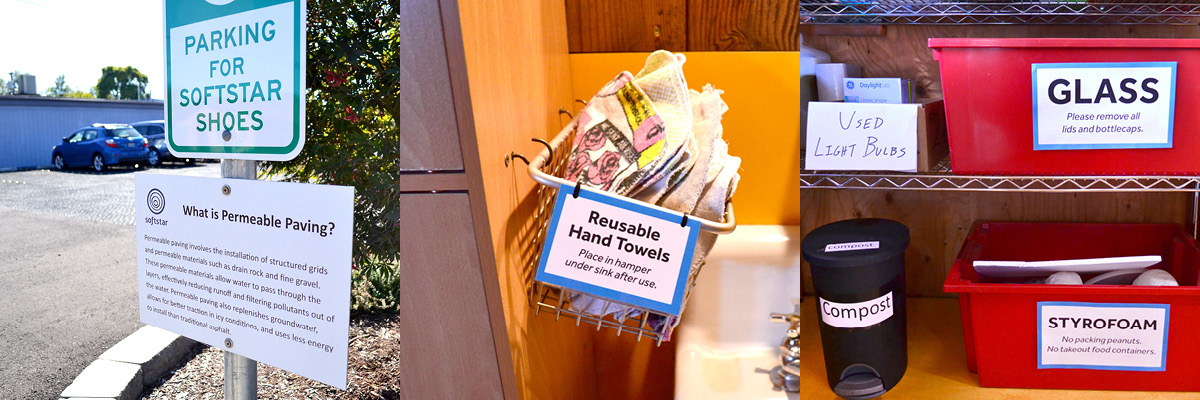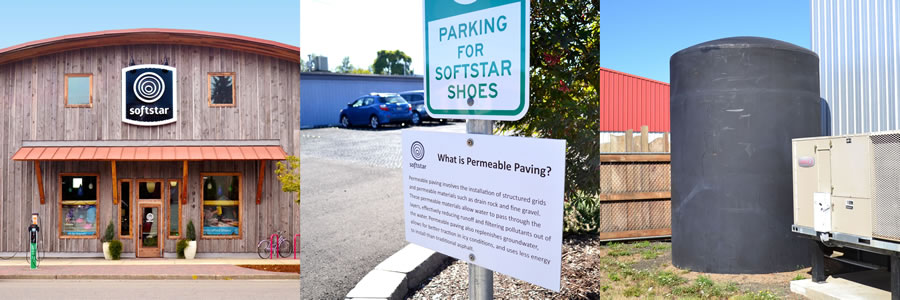Sustainable Initiatives - How We Do Business
"Walking Lightly on the Earth" is one of Softstar's core values, but it is not just about making sustainable leather shoes. We continuously evaluate our environmental initiatives and seek out new ideas for reducing our carbon footprint on every level. This includes not only the materials that go into our products but also the daily activities and processes used by our staff, the infrastructure of our building, our involvement with our community, and many other seemingly small changes that add up to make a big impact. Softstar is proud to have earned B Corporation certification, a third party audit confirming of our environmental and social responsibility. Additionally, Oregon Business has ranked Softstar among the top 100 Best Green Workplaces in Oregon every year since 2016!

Read on to learn more about our sustainable practices...
Natural Material Selection
Choosing the best materials for our shoes is not only important for the planet, but also for your health. Did you know that your skin can transdermally absorb toxins from the shoes and clothing you wear? We are careful to source materials for our products that are not only environmentally and ethically responsible, but also safe for both our employees and customers.
- Natural Leather: Most leather shoes on the market today (over 99%) are tanned with formaldehyde, which is a potential skin irritant that can poison groundwater and has been shown to cause health issues among tannery employees. All of Softstar's leather is non-toxic, tanned without formaldehyde, and colored with natural food-grade dye. Most of our leather is sourced from tanneries located within the United States, but we are unfortunately not always able to find enough materials from US sources. In that case, our leather is sourced from approved tanneries in Italy, Brazil, South Korea, or Germany that meet labor and environmental standards set by our supplier.
- EXTRA-Sustainable Ecopell: For customers who want the highest standard in sustainable leather, we offer vegetable-tanned leather from Ecopell on select custom shoes. This leather is exclusively sourced from grass-fed cows raised on controlled pastures in Germany's Bavarian Alps and is tanned using a purely vegetable-based process. Due to its higher cost, this vegetable-tanned leather incurs extra fees. Please note that as a "naked" material, vegetable-tanned leather stains very easily.
- Merino Wool: Our wool products are made from 100% merino wool that is Oeko-Tex Standard 100 certified. This certification ensures a high standard of safety in textiles and is only granted for materials that do not contain any known toxins... but it goes further than most safety standards by ruling out substances that are even remotely questionable about their toxicity.
- Genuine Sheepskin: Many shoe and clothing manufacturers advertise "real sheepskin" in their products when they actually use sheepskin that is shredded and processed with synthetic substrates to make a new material. At Softstar, we only use genuine sheepskin fleece that is unaltered (aside from being cleaned and naturally dyed) and still attached to the original leather hide.
- Green Adhesives: For shoes that require glue, such as for attaching soles, we use non-toxic adhesive to prevent exposing our workers or our customers to harmful chemicals.

Sustainable Practices
We are always on the lookout for new ways to reduce our carbon footprint in our daily routines. The following practices have become commonplace in the Softstar workshop.
- Workplace Recycling: We have bins not only for commonly recycled items like paper and glass but also materials that are difficult to recycle. This includes metal, soft plastic bags, batteries, light bulbs, and Styrofoam. Founder Elf Tim makes regular trips to dispose of these bins at our community recycling center. Softstar is a proud recipient of the Recycler of the Year Award in the Business/Institution category from the Association of Oregon Recyclers.
- 100% Green Energy: Our electricity is 100% sourced from sustainable wind and solar energy sources, reducing our carbon footprint by 83,000 pounds of carbon dioxide emissions annually. Our investment and commitment in the Blue-Sky program as a Luminary member also helps fund other community-based renewable energy projects in Oregon.
- Upcycling Leather: We carefully monitor our leather scrap output to make sure we are using as much of each hide as we can. The scraps we do produce end up in our public showroom, where local customers can take them for craft projects free of charge. We also sell these scraps on our website for only the cost of shipping.
- Reusable Hand Towels: Elf Cindy stitched fabric scraps into stylish hand towels to replace disposable paper towels in our restrooms. After use, these towels are discarded into a hamper to be washed and restocked. We have an energy-efficient washer and dryer on the premises!
- Reusable Shop Towels: Likewise, our shop towels are also reused. Our shoemaking process has many needs for towels and cleanup. Employees are encouraged to contribute old sheets and bath towels that are cut into usable sizes. These are then washed and reused as much as possible.
- Compost: Did you know we have an employee garden behind our workshop that is filled with strawberries, fruit trees, and herbs? Our employees help manage it with the use of a compost bin, where we deposit our coffee grounds and lunch scraps.
- Multipurpose Invoices: Sometimes the invoice your receive with your shoes might look a little wrinkled or stained. This is because it is the same piece of paper that is passed through our production line and used as instructions for making your shoes. Years ago we printed two separate copies for each order, one for our production team and one for a packing slip because we wanted you to receive a nice clean copy with your shoes. By using the same copy for both purposes we were able to cut our paper waste in half!
- Reusing Printer Paper: Do you know what's better than recycling paper? Reusing paper! If we only print on one side of a page (and it doesn't contain any private information) then that page is flipped over and added to a stack of repurposed paper that is fed back into our printers.

Green Workshop
In 2018 we completed renovation on a historic roller skating rink from the 1950s to become the new Softstar workshop. Creating sustainable infrastructure was a top priority, and the work earned us a DeMuro Award for excellence in historic preservation. Here are some of the ways our building contributes to our low carbon footprint.
- Repurposed Building Materials: During our building's renovation, we preserved and restored as much of the original structure as possible. For example, the usable remnants of the old skating rink floor were refurbished and used to construct the flooring in our public retail showroom. Reclaimed exterior siding was also used indoors and the soaring original trusses supporting our roof were restored and highlighted for all to enjoy. When new materials were needed they were sourced locally. Foreman Alan even mills his own lumber from local trees!
- Uncoated Wood Construction: No drywall, paint, or chemicals were used in the construction of our workshop, and there was no need for solvent-based coating, curing/release agents, or treatments. Visitors to our shop are often impressed with the beauty of our natural, unfinished wood interior. Likewise, our exterior siding is made from locally-sourced Doug Fir wood, which is aged naturally and never needs to be painted or coated. This also helps maintain our building's historical aesthetic.
- Electric Vehicle Charging Station: With the help of a grant from Pacific Power, we have installed an EV charging station in front of our workshop for our staff, customers, and the general public. We are located on a road that is a popular route to the Oregon coast, so we see coastal commuters charging up daily!
- Permeable Parking Lot: Did you know that even parking lots can be sustainable? Unlike common asphalt parking lots, our lot was designed to allow stormwater to filter naturally into the ground, thereby reducing the concentration of pollutants. In addition, our lot was constructed without petroleum or other synthetic chemicals commonly found in traditional asphalt.
- Double Pane Windows: Made to match the original style of the building, double pane windows were added to increase natural light and decrease energy use.
- Sustainable Fasteners: Instead of "invisible" fasteners, screw and bolt connections were used throughout our shop to enable easy deconstruction without sacrificing the utility of materials, in case remodeling is needed in the future.
- Low Wattage Lighting: Our building is illuminated with 100% LED lighting to reduce electrical usage.
- Low Carbon Temperature Control: Heating a large space is always an energy challenge, but we found that radiant flooring was the most efficient solution. Our radiant floor now supplies 100% of our heating needs. Sustainable materials were used to insulate the walls and roof of our workshop to reduce energy consumption. In the summer, our shop is cooled by efficient heat exchange fans that are set on timers to pull in fresh cold air during the night.
- Low-Flow Plumbing: Water-conserving faucets and toilets are estimated to save 40,000 gallons of water each year.
- Water Cistern: A large cistern reclaims water runoff from our rooftop. This water is used for outdoor irrigation of our employee garden, which our staff maintains for a fresh supply of strawberries, tree fruits, and herbs.

Commitment to Local Production and Community
- Local Production: The carbon footprint of most shoe companies is staggering compared to the foot they cradle. Often materials are sourced in one location, staged in another, constructed in a third and packed in yet another before being bulk crated and shipped to their country of destination. On average, imported shoes and their associated components are transported over 11,000 miles before they even reach their port of call. Softstar is one of only a handful of shoe manufacturers preserving the tradition of crafting shoes in the USA and providing living wage jobs for our local community.
- Employee Sustainability Committee: We are forever grateful to be part of a local community that encourages environmentally-friendly practices, and our talented shoemaking elves are leading the way! Many of our sustainable initiatives began as suggestions from our staff, and a dedicated group of our employees have formed Softstar's official Sustainability Committee. This committee meets regularly to evaluate our current practices and discuss new ideas to make Softstar even more sustainable.
- Alternative Transportation: We provide our staff with financial incentives to commute to work by bicycle or by carpool. Employees with electric vehicles receive discounts at our EV charging station. Free bus passes are also provided to employees who can use public transportation.
- Giving Back: Being generous is part of being a responsible global citizen, and it is an integral part of our Softstar culture. We contribute regular financial support to the Earth Island Institute and actively participate in our local Corvallis Sustainability Coalition. Employee donations are matched and we donate thousands of dollars and shoes to charities and schools each year. Elves enjoy adding an extra touch of creativity to each playful pancake order they craft and ship knowing 100% of proceeds help children in need.
- Resale and Reuse: It makes us sad to see good shoes go to waste, especially if they still have a lot of miles left in them. That's why we introduced our Softstar resale page. This page helps connect our fans to a Buy/Sell/Trade page and also provides an eBay tool to create a community where customers can buy and sell their used shoes to each other. By reusing shoes as much as possible, we reduce waste!
"Thank you, thank you, thank you!!!! I have purchased over 8 pair of 'minimalist' shoes in the past 3 years...none of them felt like walking barefoot to me......until now. Your leather is soft your soles are flat and my foot is relaxed!!!"
"My entire experience with Softstar has been nothing short of an amazing experience from beginning to end. Will not buy any other shoes...my feet no longer hurt at all."
"This shoe is exactly what you would hope it to be. High quality leather and workmanship in a simple, natural stance running shoes made of all natural materials. Glad I found them."
"I've never had shoes that have fit as well as these or received as many compliments… I wish I had found them sooner!"
"There are no other shoes like Softstar - strong, comfortable, pretty - the best choice of minimal shoes one can get. Thank you for making our lives easier and wonderful!"
"I am loving these shoes! They are just lovely to have on the feet. And I am not easily impressed... There's nothing on the market that I know of that allows full toe splay! To me, it's a beautiful thing to let the toes move with absolute freedom in the shoe. I cannot do that with ANY OTHER of the barefoot shoes."
"I spent SO MANY years searching for a shoe to fit my feet. At last, you have given me such a shoe! I am convinced that had I met this shoe 30 years ago, I would not have the deformed feet I have now, nor would I have had surgery done on one of them. Abundant thanks for this design that honors my feet."
"These shoes are absolute perfection… The toe box finally allows my pinky toe and big toe to splay naturally and has taken away all previous foot pain… My feet will accept nothing less now."
"Finally something I will wear to work that is truly foot shaped… I usually take my shoes off as soon as I arrive home. I was so comfortable in these that I didn't think about it, and I left them on for hours into the evening."
"These are fantastic. Softstar showed themselves as the best minimal shoe company on the market with these. Functionally, they are the best fitting shoes I own, and they are the most stylish."
"Blown away. These should be the standard. I work at a physio clinic and see multiple people come in with foot pain (bunions, flat feet, plantar fasciitis) and it's mostly because of the effects of improper footwear over time... These shoes are the perfect solution."
"These are the best shoes I've ever owned. FINALLY A TOE BOX SHAPED LIKE A HEALTHY FOOT… I can wear my toe separators in these without any squishing or pressure against the sides of the shoe. Finally, finally, finally... someone prioritized function over form in creating a shoe that feels great to wear."

